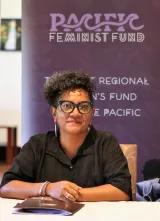
Which role does feminist development and foreign policy play as a tool of state-funded resources for feminist movements and organisations? A discussion with the activists Amina Doherty and Michelle Reddy.

In this article, I engage with Amina Doherty (Black Feminist Fund, and the Equality Fund) and Michelle Reddy (Pacific Feminist Fund) to talk about how feminist foreign and development policies are a tool to transform governmental funding for feminist movements. They both advocate for more inclusive and participatory approaches to grant-making in the Caribbean and the Pacific Islands. Hence, despite governments having committed to sustainable funding, feminist civil society remains historically underfunded, in particular civil society groups that marginalised groups lead.
Financial Challenges for Feminist Movements
All states with feminist development and foreign policies highlight the necessity of intersectionality. Yet, while Human rights funding is increasing overall, the percentage of human rights funding that goes to Black communities globally is alarmingly low. The Black Feminist Fund study shows that 0.1%–0.35% of foundation giving globally went to Black women, girls and trans people (see illustration). These statistics are shocking and a call for action at the same time.
Michelle Reddy also shares this call for feminist funding through an intersectional lens: “The German government needs to be responsive to the moment, and at the same time be able to think a long game.”
Why long-term funding, immediate response and intersectionality must be interlinked becomes clear when fighting the climate crisis. Despite contributing the least to the climate crisis, the Pacific region is already suffering from its impacts. If governments take the climate crisis seriously, they need to support community-led feminist initiatives that leverage cultural and indigenous knowledge for mitigating the climate crises, adds Reddy.
Germany’s commitment to feminist funding
The German Ministry for Economic Cooperation and Development and the German Foreign Office are both committed to funding historically marginalised groups. For example,
“In the provision of financial protection against climate risks under the Global Shield against Climate Risks, the BMZ advocates for the implementation of feminist approaches and for consideration to be given to key vulnerability factors such as age, gender identity, disabilities, individual legal status and others.” (1 )
The BMZ commitment is underlined with concrete numbers and budget. By 2025, it will double the proportion of new project funding commitments for measures with the principal objective of gender equality. Additionally, the proportion of new project funding for efforts where gender equality is a significant objective will be increased to 85 per cent (Federal Ministry for Economic Cooperation and Development, 2023, Strategy Feminist Development Policy, p.28). Although the financial goals are new, the necessity for gender-specific funding was already introduced by the previous government, before Germany announced its feminist development policy in 2023. This is not the case for the Federal Foreign Office.
“In a first step, we have already ensured that it will for the first time be mandatory to review gender categories based on OECD criteria for all project funding in the Federal Foreign Office’s 2023 budget. In 2023 this funding amounts to EUR 5.5 billion euro out of an overall budget of EUR 7.5 billion. […] For the first time, putting the Federal Foreign Office in a position to take budget decisions tailored to gender equality in all working areas in which project funding is allocated.” (2 )
It is essential to note that feminist funding is not a new concept that was introduced by feminist development and foreign policy.
Amina points out that some governments have sought to resource feminist movements before the rise of official feminist foreign policies as captured in some of the early research led by the Association for Women’s Rights in Development (AWID). Some examples of them include the Dutch Ministry of Foreign Affairs MDG3 Fund, funding from the Norwegian Ministry of Foreign Affairs, The Swedish International Development Cooperation Agency (SIDA) and The Fund for Gender Equality. More recently, we have seen commitments in funding for Gender Equality from both the Canadian and UK Governments through the Equality Fund. In particular, the Netherlands and Canada have continued to pledge to feminist funding in the course of their feminist development and foreign policies. Yet, reflecting on a feminist utopia, Reddy stresses the significance of a feminist funding lens across all government policies. A ministry may have a solid feminist foreign policy, but the whole government itself has contradictory stances on trade, which, in fact, neglects a feminist lens. Another challenge that comes with feminist funding is the rise of right-wing governments that defund feminist policies and invest more and more into anti-gender laws.
Call for power in philanthropy and governmental funding
Feminist policies mean distributing power hierarchies. An overall shift of power in the philanthropical landscape is, therefore, necessary to make feminist funding a reality. This means that governments need to put feminist funding as a core policy, but also foundations have to commit to greater long-term funding. For example, the Black Feminist Fund aims to acquire financial resources to fund organisations for eight to 10 years (see Open Letter to Philanthropy). Feminist funds are necessary because they act as intermediaries between governments and civil society. In particular, grassroots movements do face challenges when navigating the complexities of government funding requirements. They do not possess the infrastructure to apply for funding or manage significant volumes of financial resources. This is where feminist funds are stepping in. Feminist funds not only redistribute financial resources but also detect continuous patterns that contribute to the precarity of feminist organisations. It is because of the historical underfunding that feminist organisations do not have adequate financial means to invest in inclusive capacity building as well as in the well-being of their own staff, concludes Michelle Reddy. This results in the fact that the already privileged continue to take part in feminist movements, and the already marginalised drop out. A power shift in funding would finally contribute to the meaningful participation of the most marginalised.



